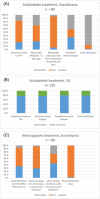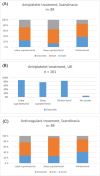Antithrombotic treatment after intracerebral hemorrhage: Surveys among stroke physicians in Scandinavia and the United Kingdom
- PMID: 36698713
- PMCID: PMC9854165
- DOI: 10.1002/hsr2.1059
Antithrombotic treatment after intracerebral hemorrhage: Surveys among stroke physicians in Scandinavia and the United Kingdom
Erratum in
-
Correction to "Antithrombotic treatment after intracerebral hemorrhage: Surveys among stroke physicians in Scandinavia and the United Kingdom".Health Sci Rep. 2024 Feb 13;7(2):e1917. doi: 10.1002/hsr2.1917. eCollection 2024 Feb. Health Sci Rep. 2024. PMID: 38352695 Free PMC article.
Abstract
Background and aims: It is unclear whether patients with previous intracerebral hemorrhage (ICH) should receive antithrombotic treatment to prevent ischemic events. We assessed stroke physicians' opinions about this, and their views on randomizing patients in trials assessing this question.
Methods: We conducted three web-based surveys among stroke physicians in Scandinavia and the United Kingdom.
Results: Eighty-nine of 205 stroke physicians (43%) responded to the Scandinavian survey, 161 of 180 (89%) to the UK antiplatelet survey, and 153 of 289 (53%) to the UK anticoagulant survey. In Scandinavia, 19 (21%) stroke physicians were uncertain about antiplatelet treatment after ICH for ischemic stroke or transient ischemic attack (TIA) and 21 (24%) for prior myocardial infarction. In the United Kingdom, 116 (77%) were uncertain for ischemic stroke or TIA and 115 (717%) for ischemic heart disease. In Scandinavia, 32 (36%) were uncertain about anticoagulant treatment after ICH for atrial fibrillation, and 26 (29%) for recurrent deep vein thrombosis or pulmonary embolism. In the United Kingdom, 145 (95%) were uncertain about anticoagulants after ICH in at least some cases. In both regions combined, 191 of 250 (76%) would consider randomizing ICH survivors in a trial of starting versus avoiding antiplatelets, and 176 of 242 (73%) in a trial of starting versus avoiding anticoagulants.
Conclusion: Considerable proportions of stroke physicians in Scandinavia and the United Kingdom were uncertain about antithrombotic treatment after ICH. A clear majority would consider randomizing patients in trials assessing this question. These findings support the need for such trials.
Keywords: antithrombotic treatment; intracerebral hemorrhage; ischemic events; secondary prevention; stroke.
© 2023 The Authors. Health Science Reports published by Wiley Periodicals LLC.
Conflict of interest statement
R. A. S. received funding from the British Heart Foundation, paid to the University of Edinburgh, for the RESTART and SoSTART trials. The remaining authors declare no conflict of interest.
Figures


Similar articles
-
Antithrombotic and Statin Prescription After Intracerebral Hemorrhage in the Get With The Guidelines-Stroke Registry.Stroke. 2023 Dec;54(12):2972-2980. doi: 10.1161/STROKEAHA.123.043194. Epub 2023 Nov 9. Stroke. 2023. PMID: 37942641 Free PMC article.
-
Antiplatelet Agent Use After Stroke due to Intracerebral Hemorrhage.Stroke. 2023 Dec;54(12):3173-3181. doi: 10.1161/STROKEAHA.123.036886. Epub 2023 Nov 2. Stroke. 2023. PMID: 37916459 Review.
-
Antithrombotic Treatment Following Intracerebral Hemorrhage in Patients With and Without Atrial Fibrillation.Stroke. 2015 Aug;46(8):2094-9. doi: 10.1161/STROKEAHA.115.009087. Epub 2015 Jul 9. Stroke. 2015. PMID: 26159794
-
The REstart or STop Antithrombotics Randomised Trial (RESTART) after stroke due to intracerebral haemorrhage: study protocol for a randomised controlled trial.Trials. 2018 Mar 5;19(1):162. doi: 10.1186/s13063-018-2542-6. Trials. 2018. PMID: 29506580 Free PMC article.
-
Contemporary Antiplatelet and Anticoagulant Therapies for Secondary Stroke Prevention: A Narrative Review of Current Literature and Guidelines.Curr Neurol Neurosci Rep. 2023 May;23(5):235-262. doi: 10.1007/s11910-023-01266-2. Epub 2023 Apr 11. Curr Neurol Neurosci Rep. 2023. PMID: 37037980 Review.
Cited by
-
Antithrombotic and Statin Prescription After Intracerebral Hemorrhage in the Get With The Guidelines-Stroke Registry.Stroke. 2023 Dec;54(12):2972-2980. doi: 10.1161/STROKEAHA.123.043194. Epub 2023 Nov 9. Stroke. 2023. PMID: 37942641 Free PMC article.
References
-
- Andersen KK, Olsen TS, Dehlendorff C, Kammersgaard LP. Hemorrhagic and ischemic strokes compared: stroke severity, mortality, and risk factors. Stroke. 2009;40(6):2068‐2072. - PubMed
-
- Lovelock C, Molyneux A, Rothwell P. Change in incidence and aetiology of intracerebral haemorrhage in Oxfordshire, UK, between 1981 and 2006: a population‐based study. Lancet Neurol. 2007;6(6):487‐493. - PubMed
-
- Pennlert J, Asplund K, Carlberg B, et al. Antithrombotic treatment following intracerebral hemorrhage in patients with and without atrial fibrillation. Stroke. 2015;46(8):2094‐2099. - PubMed
-
- Pasquini M, Charidimou A, van Asch CJJ, et al. Variation in restarting antithrombotic drugs at hospital discharge after intracerebral hemorrhage. Stroke. 2014;45(9):2643‐2648. - PubMed
-
- Ottosen TP, Grijota M, Hansen ML, et al. Use of antithrombotic therapy and long‐term clinical outcome among patients surviving intracerebral hemorrhage. Stroke. 2016;47(7):1837‐1843. - PubMed
Grants and funding
LinkOut - more resources
Full Text Sources

